- Home
- Johnny D. Boggs
Greasy Grass Page 4
Greasy Grass Read online
Page 4
“Young men,” Sitting Bull said, “leave the soldiers alone unless they provoke us.”
“As they attacked our mothers and sisters at Sand Creek?” someone sang out. “As they attacked our mothers and sisters at the Washita, where the icy river flowed red with the blood of our loved ones?”
“More of our people join us every day,” another said. “We become stronger each morning. Listen to Sitting Bull. Let us wait for the soldiers, for we will be stronger by the time they reach us.”
“Let us smoke on this,” my brother suggested, and the warriors nodded at Comes-In-Sight’s wisdom.
Someone tugged my arm. Other women were already preparing to move. I should help them, but I looked at Little Hawk, I looked at my brother. No matter how many pipes were passed, no matter what the elders like Sitting Bull said, the minds of our young men had already been made up. I knew what they would do. I knew what I must do.
They began slipping out of camp that night, only a few young men at first, then many more. Outside, drums beat, and men and women, Hotóhkesos, Human Beings, and others, sang. I threw off my buffalo robe, dressed, grabbed one of my brother’s quivers and bows.
My mother sat up, demanding, “Tosa’a ne-ho-ohtse?”
“I go with my brother,” I answered, and, before she could say any more, I had ducked out of our lodge, and was running to the pony herd.
All night, for fifty miles we rode, stopping only to rest our ponies, to tie up their tails, and paint our faces for war. I dipped my fingers in vermillion and drew a lightning bolt across my forehead. Then Little Hawk roughly grabbed my wrist, twisted, turned, and dumped me on the grass.
“What are you doing here, woman?”
Anger blacked my face, my heart. Suddenly I was aware my right hand gripped the bone handle of my knife.
“Go back!” My brother stood over me, pointing north. “Go back to our village!”
No longer did I feel hatred and anger, for my brother and Little Hawk looked handsome, strong, dressed in their finest clothes, their faces painted for war.
Yet I had no intention of leaving this place. “I came to fight!” I yelled.
“Ha!” a Hotóhkeso cried, and others joined him in laughing.
Comes-In-Sight did not laugh. Nor did Little Hawk.
“Only warriors fight,” my brother said. “Not women. All the men have come to fight.”
“That is not true,” a tired voice said, and I stood to see Sitting Bull, standing, buffalo headdress on his weary head. His arms remained ugly and swollen from the wounds he gave to the Great Spirit during the Sun Dance. “I do not believe we should fight these Long Knives, but I come to support you, to encourage you. It is the way.”
“It is the way for a man,” Little Hawk said. “Not a woman.”
“Buffalo Calf Road Woman,” Sitting Bull said, “may stay with me, although we Lakotas let our women ride with us into battle. It is good.”
“Hokay hey!” the Hotóhkeso warriors cried out, brandishing their war axes, their rifles, their fists as the mounted their war ponies. Others continued that cry.
“It is a good day to die!”
They rode, whooping, singing, ready for battle. A giant cloud of dust followed, stretching high into the morning sky. Old Sitting Bull took my hand, but I had to gather the bridle of my pony before she took off after the running ponies.
I could not see, only could hear the thunder of hoofs.
“Come,” Sitting Bull said, and through the choking dust I followed him as he led his black mare up the ridge. More and more ponies road by, carrying Human Beings and other Indians. When we reached the top of the ridge with other young boys, and, yes, a few women, I turned to watch.
“There are so many,” I whispered.
“Yes,” said Sitting Bull. “But there are many Long Knives, too.”
Never had we Human Beings attacked a party of warrior white men. Only in defense of our villages, our people. The warrior white men always brought the war to us. This time, we would strike them first. This was different. It was not like stealing ponies or counting coup among the Crows or Snakes.
In the early morning, shots rang out. Sitting Bull mounted his mare, as I did mine, and we followed our warriors, seven hundred or maybe even ten hundred, to watch the fight.
It was a good fight. Many coups were taken.
The warrior white men and their Snakes and Crow scouts were very brave, too. Many died well.
Behind us, the women began to sing death songs. One was already in mourning, for her husband had fallen, his body retrieved by two Hotóhkeso braves, who carried him up the hill, dropped him beside his wife, and loped back down to rejoin the fight.
The air smelled of rotten eggs. The warrior white men’s big guns on wheels roared. Our men retreated, but they did not continue to run. Wheeling their mounts, they charged back into the thick smoke and dust.
“The white eyes,” Sitting Bull said, “did not expect us to fight like this.” He turned to me, and smiled. “I did not expect this, either.”
My face brightened. I spoke the Hotóhkeso words, “Hokay hey.”
Sitting Bull answered in my own tongue. “It is a good day to die.”
All morning, and into the afternoon, the fight went on. The smell of death became stronger. Sitting Bull had begun to sing, his eyes closed, his scabbed, bloody arms folded over his breastplate.
The warrior white men and their scouts would charge, and be driven back. Our warriors would charge, and be driven back.
A young Hotóhkeso rode toward me, dangling in his hand a spotted war bonnet, one he must have taken off a Snake he had killed. He shouted something I could not understand, then a hole appeared in his chest, blood spraying, and his eyes no longer saw me as he slipped from the saddle. The pony ran away. The boy did not move.
Sitting Bull sang. The women behind him wailed.
When I looked away from the dead boy, I saw my brother, leading four other Human Beings against the vehos. Many times he had done this. Then his pony fell dead, crashing head over heels, sending Comes-In-Sight slamming into the hard ground. White Elk galloped past him, so focused on the battle that he did not notice my brother, who slowly pulled himself off the ground, and staggered, dizzily, toward the wall of blue-coated white men. Dust from the bullets kicked up around my brother.
“Hokay hey!” shouted a Hotóhkeso boy behind me.
Another screamed, “Today is a good day to die!”
I kicked my mare’s sides, and rode, tears streaming down my face. It may be a good day to die, I thought, but I shall not let my brother die.
My mare, stolen from the Snakes by Comes-In-Sight four summers ago, leaped over the body of a dead Crow, his scalp taken. Shouting my brother’s name, I could not even hear my own voice. A bullet tugged my left braid. Another tore off a shell on the side of my dress.
“Comes-In-Sight!” I yelled. This time, he heard me, for he stopped, and turned. Blood smeared his face, which was caked with sand and grass. I jerked hard on the hackamore, and the mare slid to a stop. I reached down and felt the wind pierced by an arrow that sliced over my back. Comes-In-Sight’s hand gripped mine, and he swung up behind me. His arms wrapped around my waist, and the mare galloped away, through the dust.
A Hotóhkeso jerked his spotted pony to a stop, and shouted at me, raising his bow in honor. I did not stop until I was back on the ridge with Sitting Bull. My brother dropped from my pony. He spit out blood and bits of teeth and grass, and took my hand.
“Step down,” he said.
Sitting Bull had stopped singing. He smiled as Comes-In-Sight helped me down. Then my brother mounted my mare.
“You ride back into battle?” I asked him.
“The day is not done,” he said. He started back toward the warrior white men, but pulled the hackamore, and looked back at me. “Buffalo Calf Road
Woman,” he said, “I am glad I brought you here.” Laughing, he kicked my mare into a lope, and the dust swallowed him.
* * * * *
Only long afterward, after the fight that was to come on the Greasy Grass, did we learn that we had beaten the warrior white men led by their great chief, the ones known to us Indian peoples as Gray Wolf or Three Stars, and to the vehos as George Crook.
That afternoon, after long, hard fighting, we gathered our dead, and rode away from the Rosebud. The warrior white men did not follow us. They had had enough of battle. Days later, our scouts returned to our camp and told us that those notaxé-ve’hó’e had gone back to the south. They would not trouble us any more during that summer.
As darkness fell, my bones felt weary. I rode my mare again, for Comes-In-Sight had captured a fine red stallion belonging to a Crow. We would mourn the dead, but we would celebrate a great victory. Those that were no more had died with honor.
My eyes jerked awake. I had fallen asleep from the clopping of the hoofs. Ahead of me, I heard my fellow Human Beings singing.
They sang my name.
This much remembered fight, they said, will be known among our people as “Where the Girl Saved Her Brother.”
Chapter Seven
General
Alfred H. Terry
June 21, 1876
Aboard the Far West
Yellowstone River at Rosebud Creek, Montana Ty.
To General Philip H. Sheridan
Regimental Headquarters, Chicago
Sir:
I have the honor to report to you the plan of action I have outlined for campaign against the hostiles:
At two o’clock this afternoon, I convened with Lieutenant Colonel George A. Custer of the Dakota Column, Colonel John Gibbon, and Major James Brisbin, Second Cavalry, of the Montana Column, in the conference room of the steamer that serves as my headquarters. Major Marcus A. Reno, who had commanded the wing of the Seventh Cavalry on a scout down the Powder River, was not invited to take part in this meeting.
Major Reno disobeyed my orders in a most flagrant fashion during his “scout” of the Powder and Tongue Rivers to the south and east of our present location. The major, who has little experience in fighting Indians and has been suffering from a state of melancholy since his wife’s passing two years ago, was ordered not to go beyond the Rosebud. Yesterday afternoon, I received a note from an Indian courier that he was eight miles above my present location and was following some “hot Indian trails.” He had not supplies to warrant such disobedience, and returned to our camp with wearied horses and broken-down mules.
Colonel Custer chastised his junior officer for failing to obtain more information on the location of the hostiles. Major Reno’s “scout” produced little information and no results, and he had been on this assignment for ten days. Colonel Custer threatened a court-martial, but I intervened, saying that my rebuke was punishment enough. Also, Reno may have disregarded written orders, but we now know where the hostiles are not.
“They are not on the lower Rosebud,” Colonel Gibbon said as we unrolled our Raynolds-Maynadier map.
“Too bad,” Major Brisbin quipped. “General Crook might have whipped them by now.”
“I hope not,” Custer cheerily stated.
Having reports from the Crow scouts of seeing smoke in the valley of the Little Bighorn River, we now believe that the hostiles must be on the headwaters of the Rosebud, Bighorn, or Little Bighorn.
“Probably it is at the latter where we shall find them.” Major Brisbin’s suggestion was met with affirmations from Custer and Gibbon.
Thus, I outlined my plan: Colonel Custer would lead the Seventh up the Rosebud toward the supposed hostile encampment. I would join the Montana Column and approach with Colonel Gibbon’s command from the west, and thus we would catch the Indians in a pincer. Since Colonel Custer would have less country to maneuver across and would be unencumbered by the infantry with Colonel Gibbon’s forces, I outlined his path with stick pins, then asked Major Brisbin to trace this route with a blue pencil. Custer would march almost to the Wyoming border before turning north toward the Indians’ supposed location.
“Should you find a trail leading to the Little Bighorn,” I told Custer, “do not follow it with due haste. Proceed up the Rosebud, get closer to the mountains, then strike west, feeling to your left. But do as you deem best.”
“The hostiles would, in all likelihood, retreat south,” Colonel Gibbon suggested. “If they reach the Bighorn Mountains, they will be able to live on game and wild berries.”
“If they run south,” Major Brisbin said, “they will meet up with General Crook’s command.”
“If they get that far,” Colonel Custer said with a devilish grin.
That remark chilled me briefly, and I reminded Custer of his orders. The colonel merely nodded, and I suggested to him, “The Gatling guns and twelve-pounders are at your disposal.”
He shook his head, and, upon Colonel Gibbon’s suggestion, we sent for a scout named George Herendeen, who has been employed by Colonel Gibbon.
Herendeen is a rough sort of Irish heritage, but knows this area. We queried him on a place on the map named Tullock’s Creek, and for possible locations of hostiles. This man had impressed Colonel Gibbon much during the campaign, and his knowledge of the area gained him favor with Colonel Custer.
“Do you know this place?” Custer jabbed at the map.
“Like this.” Herendeen held out the back of his hand.
“Then you are the man I want.” Custer looked at Colonel Gibbon, who nodded his approval at the transfer of the scout to Custer’s command.
“After you have scouted the head of Tullock’s Creek,” I told the scout, “you will take a dispatch from Colonel Custer immediately to me. At which point, we should be …”
Major Brisbin finished my sentence. “Near the mouth of the Little Bighorn.”
“How much?” Herendeen asked.
“Excuse me?” I inquired.
“How much money?”
Colonel Gibbon could not hold in his snicker.
Realizing the scout was serious, and understanding the deadly nature of such an assignment, I told him, “Would two hundred dollars satisfy you?”
“Indeed, sir, it would.”
So it was agreed, and the scout departed.
“There are a lot of Indians, General Custer,” Major Brisbin told him. “With General Terry’s and Colonel Gibbon’s permission, I would gladly lend my four troops to join you, sir.”
“The Seventh is all I need, Major,” Colonel Custer said.
“Now, Custer,” Colonel Gibbon said (I am not certain if this was meant in jest or in all seriousness), “don’t be greedy, but wait for us.”
Ever so joyous, Custer waved off Colonel Gibbon’s suggestion, and left the steamer to prepare his command for the expedition.
Colonel Gibbon eyed me, pursed his lips as if thinking of something to say, but, instead, saluted, and disembarked the Far West to see to his troops.
Alone with Major Brisbin, an old, dear colleague, the cavalry commander said to me, “Permission to speak plainly, General?”
“You may always speak plainly to me,” I answered.
“Colonel Custer is brash, sir. I understand, after Major Reno’s disobedience, you not putting the major in command, but I believe you should command the Seventh, sir, and not Colonel Custer.”
I shook my head. “Colonel Custer needs a chance at redemption after incurring the wrath of President Grant.”
“You should command, General,” Major Brisbin repeated.
With a tired smile, I thanked the major for his confidence in me, but told him that I had no experience fighting Indians.
“You have more sense in your little finger than Custer has in his whole body,” Brisbin said. “You underrate your ability and
overrate Custer’s. I say this, sir, not only out of my affection and respect for you, General, but for the care of the lives of my men and officers during such perilous times.”
“I thank you, Major,” I told Brisbin, “but I must let Custer do what he does best. Lead.”
Detecting Brisbin’s frown, I said, “You do not seem to have confidence in Custer, Major.”
“None in the world,” he said.
Slowly I removed the pins, and rolled up the map, watching the blue line Major Brisbin had traced disappear.
“If Colonel Custer finds a trail, he will follow it,” Brisbin said softly. “He will attack regardless of your orders.”
“If he is successful, unlike Major Reno …” My words trailed off.
“I fear, General,” Major Brisbin said, “that you have turned this wild man loose.”
This evening, I found Custer in his tent, telling him, “I do not know what to say for the last.”
“Say whatever you want to say,” he told me.
“Use your own judgment,” I said, “and do what you think best if you strike the trail.” I took a deep breath, exhaled, and cautioned him. “And whatever you do, Custer, hold on to your wounded.”
At noon tomorrow, Colonel Custer will lead the Seventh. Colonel Gibbon’s command, the Far West, and I will proceed west along the Yellowstone River, then south on the Bighorn River and to the Little Bighorn. We expect to find the Indians somewhere between Rotten Grass Creek and the Wolf Mountains. It is my fervent wish that the next report you hear from me will detail a great victory and the defeat of the hostiles.
Your obt. servant,
Alfred H. Terry,
Brigadier General, Commanding
Chapter Eight
Mark Kellogg
Special to the Bismarck Tribune
WITH THE DAKOTA COLUMN,
YELLOWSTONE RIVER, MOUTH OF ROSEBUD,
MONTANA TERRITORY (June 22)—
To go with Custer, or remain
with the Montana Column?
Having met with Major James Brisbin—“Grasshopper Jim” to those who know of his entomological interest in those insects prevalent on these summer Montana plains—and General Alfred H. Terry on the deck of Captain Marsh’s Far West for our nightly cigars the previous evening, I asked myself that very question.

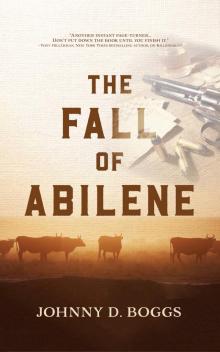 The Fall of Abilene
The Fall of Abilene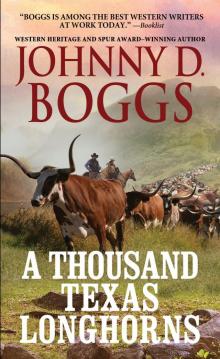 A Thousand Texas Longhorns
A Thousand Texas Longhorns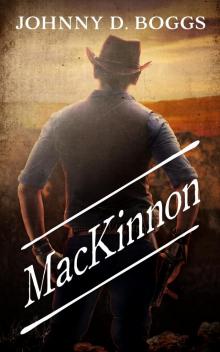 MacKinnon
MacKinnon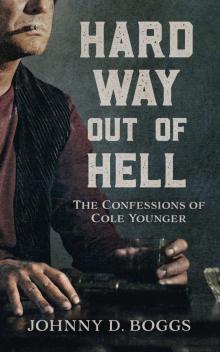 Hard Way Out of Hell
Hard Way Out of Hell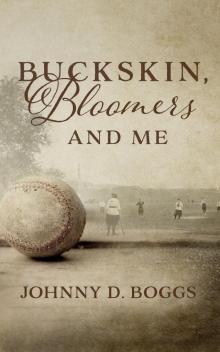 Buckskin, Bloomers, and Me
Buckskin, Bloomers, and Me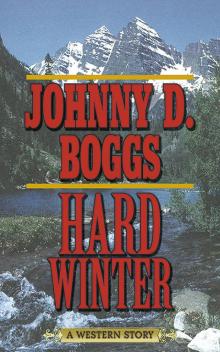 Hard Winter
Hard Winter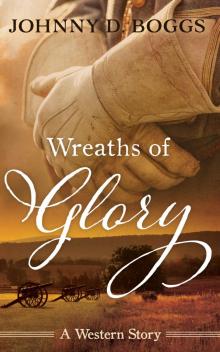 Wreaths of Glory
Wreaths of Glory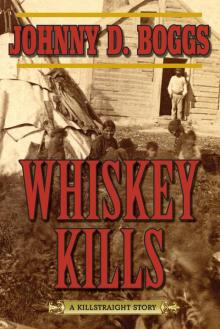 Whiskey Kills
Whiskey Kills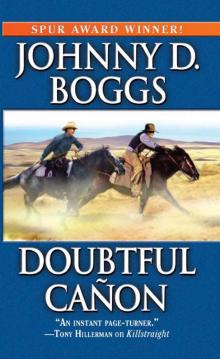 Doubtful Canon
Doubtful Canon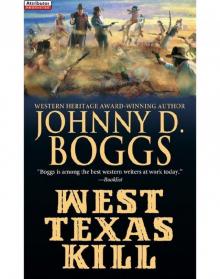 West Texas Kill
West Texas Kill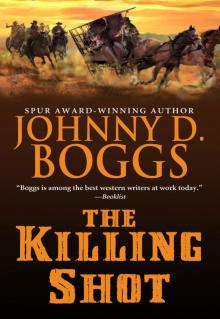 The Killing Shot
The Killing Shot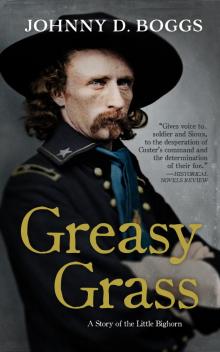 Greasy Grass
Greasy Grass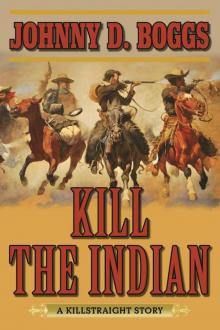 Kill the Indian
Kill the Indian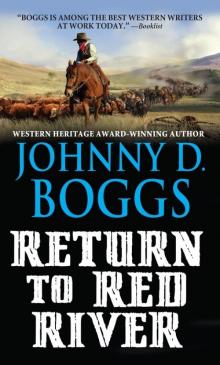 Return to Red River
Return to Red River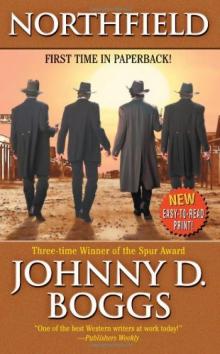 Northfield
Northfield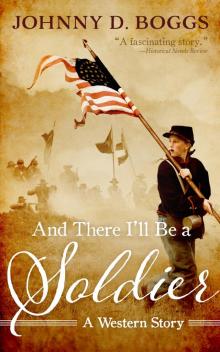 And There I’ll Be a Soldier
And There I’ll Be a Soldier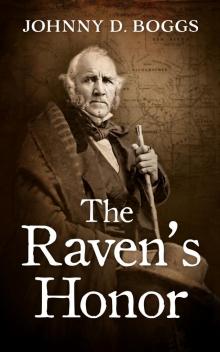 The Raven's Honor
The Raven's Honor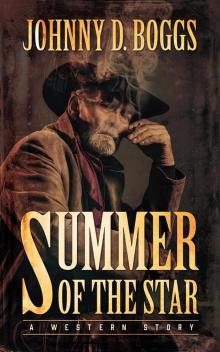 Summer of the Star
Summer of the Star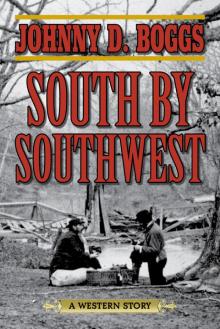 South by Southwest
South by Southwest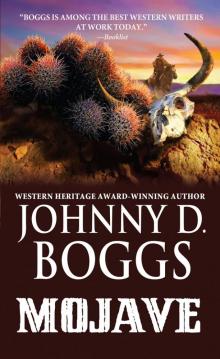 Mojave
Mojave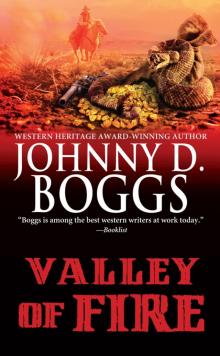 Valley of Fire
Valley of Fire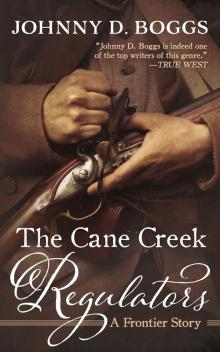 The Cane Creek Regulators
The Cane Creek Regulators